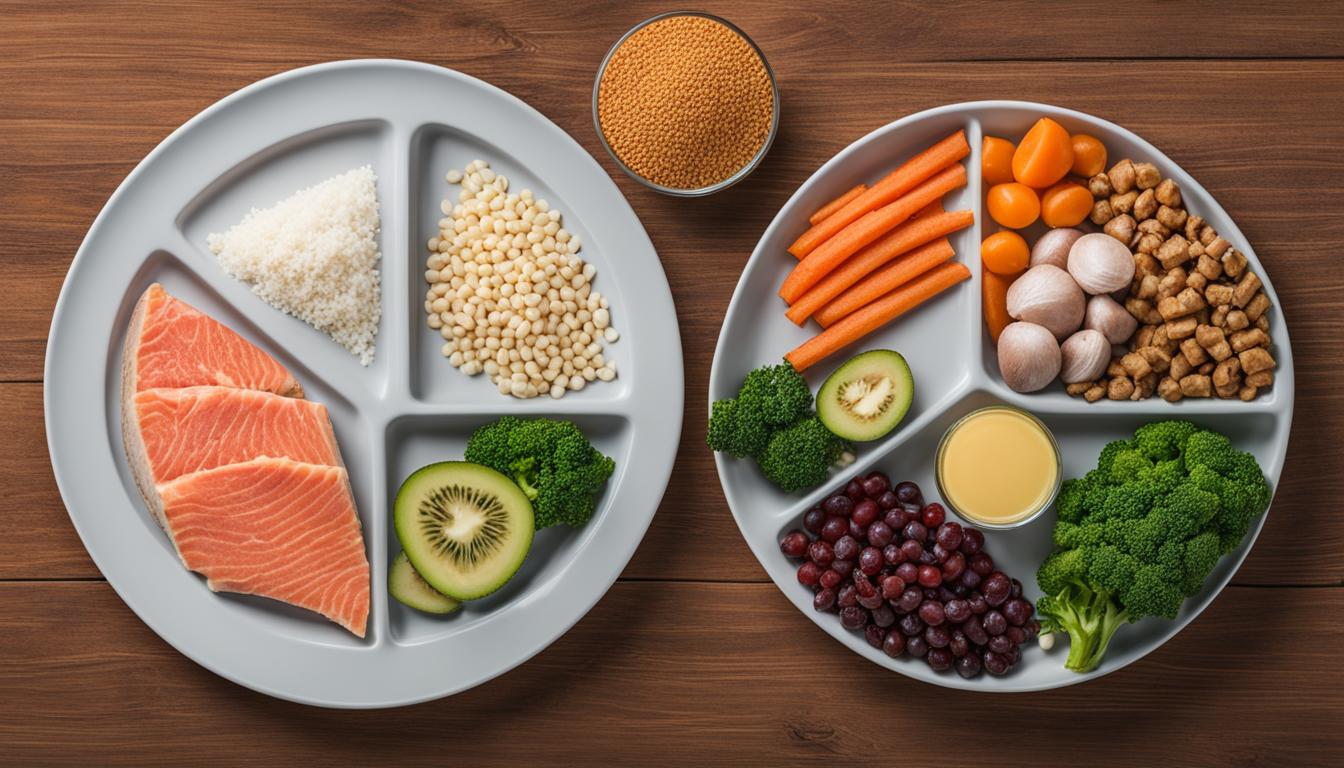Losing weight can be challenging, but protein plays a crucial role in successful and sustainable weight loss. In this comprehensive guide, we will explore why protein is so important during weight loss, including its impact on metabolism, muscle preservation, and overall health. By understanding the power of protein, you can achieve lasting weight loss results and improve your overall well-being.
Key Takeaways:
- The Power of Protein for sustainable weight loss
- Protein’s impact on weight management and metabolism
- The importance of protein in muscle preservation
- Benefits of protein for weight loss and overall health
- Protein’s role in sustainable weight management
Protein and Weight Loss
Protein plays a crucial role in achieving successful and sustainable weight loss. Its impact on metabolism, satiety, and overall health is undeniable. Incorporating a high protein diet can enhance your weight loss journey and lead to long-term results.
The Thermic Effect of Food
Protein has a powerful effect on metabolism. Through the thermic effect of food, the body burns more calories digesting protein compared to carbohydrates and fats. This means that by consuming protein-rich foods, you can increase your calorie expenditure and boost weight loss.
Increased Satiety
Not only does protein help burn calories, but it also increases satiety. Including protein in your meals and snacks can help control your appetite and reduce calorie intake. Protein keeps you feeling fuller for longer, making it easier to stick to your weight loss plan without feeling deprived or hungry.
Incorporating a high protein diet into your weight loss journey can maximize your results and improve your overall well-being.
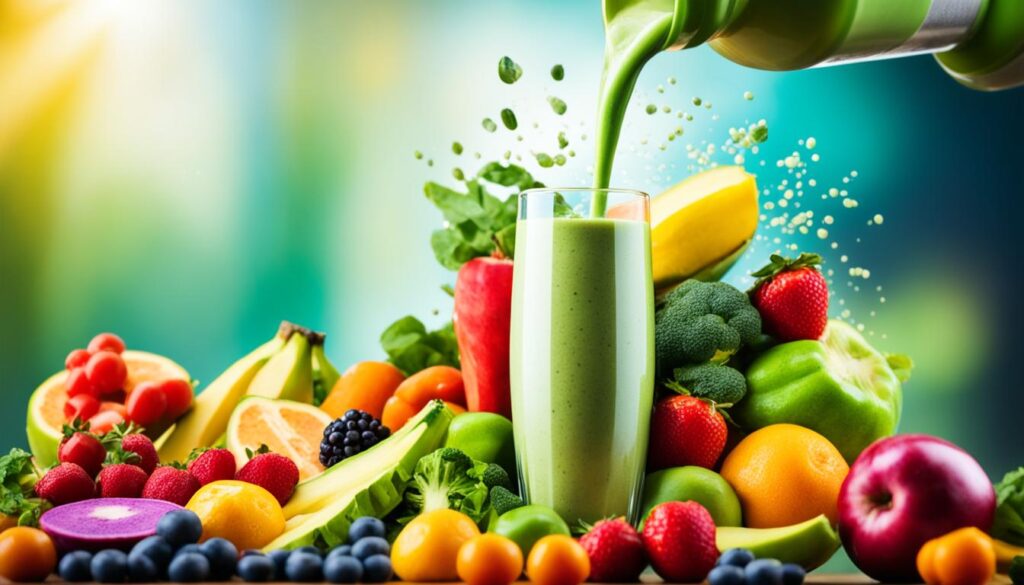
Whether you choose animal-based or plant-based proteins, the key is to ensure an adequate and diverse protein intake. This will provide essential amino acids that support muscle preservation, repair, and overall health.
By prioritizing protein and incorporating it into your weight loss plan, you can achieve sustainable results and maintain a healthy weight. Remember, protein is not only beneficial for weight loss but also for long-term weight management and improved overall well-being.
Muscle Preservation
During weight loss, preserving lean muscle mass is crucial for long-term success. Protein plays a vital role in this process by providing the necessary building blocks for muscle protein synthesis, allowing for the growth and repair of muscle tissues.
Combining a higher protein intake with regular strength training exercises can further enhance muscle preservation and even contribute to the development of lean muscle mass. This is important because muscle is metabolically active tissue, meaning it helps increase your resting metabolic rate and burn more calories, even when you’re at rest.
Strength training exercises, such as weightlifting or bodyweight exercises, stimulate the muscles to adapt and become stronger. When paired with an adequate protein intake, strength training provides the necessary stimulus for muscle protein synthesis, optimizing muscle growth and preservation.
A higher protein intake not only supports muscle preservation during weight loss but also helps prevent muscle wasting. By prioritizing protein-rich foods like lean meats, fish, eggs, dairy products, and plant-based protein sources, you can ensure optimal muscle preservation throughout your weight loss journey.
“Strength training combined with a higher protein intake is a powerful strategy for maintaining and increasing lean muscle mass during weight loss.”
The Role of Protein Synthesis
Protein synthesis is the process by which the body uses amino acids to build new proteins. During weight loss, protein synthesis becomes vital in preserving and repairing muscle tissues, as well as supporting other essential bodily functions.
While the body can break down muscle protein to obtain amino acids for energy during periods of calorie restriction, adequate protein intake helps minimize muscle breakdown and promote protein synthesis, ensuring the preservation of lean muscle mass.
Incorporating high-quality protein sources into your diet, such as whey protein, lean meats, poultry, fish, legumes, and soy products, provides the necessary amino acids for optimal protein synthesis and muscle preservation.
Optimizing Protein Intake for Muscle Preservation
Aiming for a protein intake of 1.2 to 2.0 grams per kilogram of body weight is generally recommended for individuals seeking to preserve muscle mass during weight loss.
Here are some tips to optimize your protein intake for muscle preservation:
- Include a source of protein in each meal, such as lean meats, fish, poultry, eggs, tofu, or legumes.
- Choose high-quality protein sources that provide all essential amino acids.
- Spread your protein intake evenly throughout the day to support protein synthesis.
- Consider incorporating a protein shake or bar as a convenient and quick protein source.
By prioritizing protein intake and combining it with strength training exercises, you can effectively preserve and even build lean muscle mass during your weight loss journey.
Higher Protein Intake for Weight Loss
When it comes to achieving successful and lasting weight loss, increasing your protein intake is a game-changer. Numerous studies have shown that a higher protein diet can significantly enhance weight loss outcomes. But what exactly makes protein so effective in helping you shed those unwanted pounds?
One of the key benefits of consuming more protein is its ability to preserve lean body mass. Unlike other macronutrients like carbohydrates and fats, protein helps ensure that the weight you lose primarily comes from fat rather than muscle. This is crucial because preserving lean muscle mass not only contributes to a toned physique but also plays a vital role in long-term weight maintenance.
But that’s not all. Protein-rich foods also provide greater satiety, meaning they help you feel fuller for longer. This can be a game-changer when you’re on a calorie-restricted diet, as it helps control your appetite and reduces the likelihood of overeating. When you feel satisfied after a meal or snack, it’s much easier to stick to your weight loss plan without feeling deprived or hungry.
Additionally, protein has a unique metabolic advantage. The thermic effect of protein refers to the energy required to digest, absorb, and process the nutrients. Compared to carbohydrates and fats, protein has a higher thermic effect, which means that your body burns more calories during the digestion process. This can give your metabolism a significant boost and help you burn more calories, even while at rest.
“A higher protein intake is not only beneficial for weight loss but also has a positive impact on preserving lean body mass, controlling appetite, and creating a metabolic advantage.”
To summarize the benefits of higher protein intake for weight loss:
- Preserves lean body mass
- Controls appetite and reduces overeating
- Provides greater satiety
- Creates a metabolic advantage for increased calorie burn
So, if you’re looking to maximize your weight loss efforts and achieve a leaner, healthier body, consider incorporating more protein into your diet. Whether it’s through lean meats, fish, poultry, dairy products, legumes, or plant-based alternatives, there are plenty of delicious and nutritious ways to increase your protein intake.
Remember, a higher protein intake not only helps you shed those extra pounds but also supports long-term weight maintenance and promotes overall health and well-being.
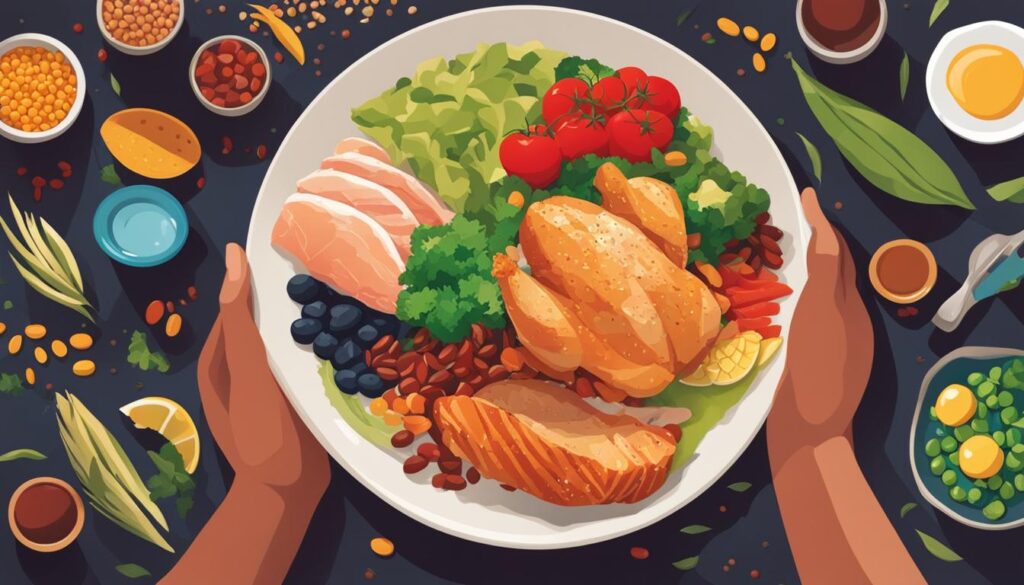
| Protein-Rich Foods | Protein Content (per 100g) |
|---|---|
| Chicken Breast | 31g |
| Salmon | 20g |
| Greek Yogurt | 10g |
| Lentils | 9g |
| Tofu | 8g |
| Almonds | 21g |
How Much Protein Do You Need?
The amount of protein you need during weight loss can vary depending on several factors. While there are common recommendations, individual variations such as activity level and calorie intake also play a role in determining your protein requirements.
For weight loss, it is generally suggested to aim for a protein intake of 1.2 to 2.2 grams per kilogram of body weight. This range ensures that you have an adequate amount of protein to support muscle maintenance and repair while in a calorie deficit.
Factors Influencing Protein Requirements
When determining your protein needs, consider the following factors:
- Body Weight and Protein Consumption: Generally, individuals with higher body weights may require more protein to support their weight loss journey. This is because a larger body typically has a higher amount of lean muscle mass that needs to be preserved.
- Activity Level and Protein Needs: If you have an active lifestyle or engage in regular exercise, you may require more protein to support muscle repair and growth. Endurance athletes, weightlifters, and people involved in strength training exercises may especially benefit from higher protein intakes.
- Individual Variations in Protein Intake: Some people may have specific dietary preferences or restrictions that impact their protein intake. For example, vegetarians or vegans may need to ensure they are getting adequate protein from plant-based sources.
Considering these factors and consulting with a healthcare professional or a registered dietitian can help you determine the right protein intake for your weight loss goals and individual needs.
| Factor | Protein Requirements |
|---|---|
| Body Weight and Protein Consumption | Higher body weight may require more protein for weight loss |
| Activity Level and Protein Needs | Active individuals or those engaging in strength training exercises may need higher protein intakes |
| Individual Variations in Protein Intake | Specific dietary preferences or restrictions may impact protein choices and intake |
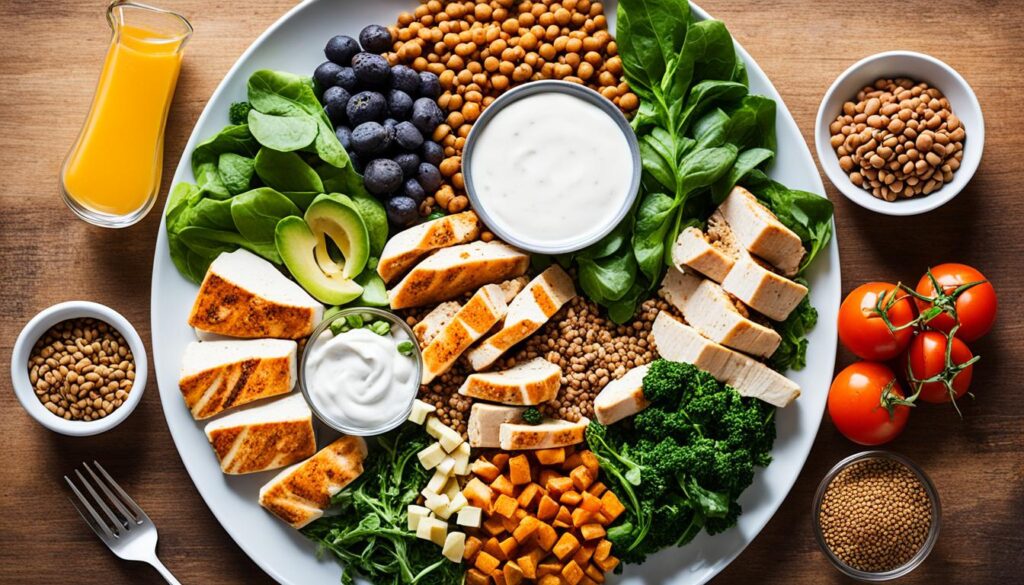
Consulting with a healthcare professional or a registered dietitian can help you determine the right protein intake for your weight loss goals and individual needs.
Sources of Protein
Protein is an essential nutrient that can be obtained from both animal-based and plant-based sources. Animal-based proteins, such as lean meats, poultry, fish, and dairy products, are considered complete proteins as they contain all the essential amino acids required by the body. These amino acids play a vital role in various bodily functions, including muscle growth, tissue repair, and hormone production.
On the other hand, plant-based sources also provide ample protein but may require a more diverse dietary approach to ensure all essential amino acids are covered. Legumes like beans and lentils, soy products like tofu, and nuts like almonds are excellent plant-based sources of protein. By incorporating a variety of these plant-based protein sources into your diet, you can ensure that you are consuming all the essential amino acids necessary for your overall well-being.
Here’s a comparison of animal-based and plant-based proteins:
| Animal-Based Proteins | Plant-Based Proteins |
|---|---|
| Lean meats (beef, pork, lamb) | Beans |
| Poultry (chicken, turkey) | Lentils |
| Fish | Tofu |
| Dairy products (milk, cheese, yogurt) | Nuts (almonds, walnuts) |
Both animal-based and plant-based proteins have their own advantages and can be included in a balanced diet. It’s important to choose protein sources that align with your dietary preferences and health goals.
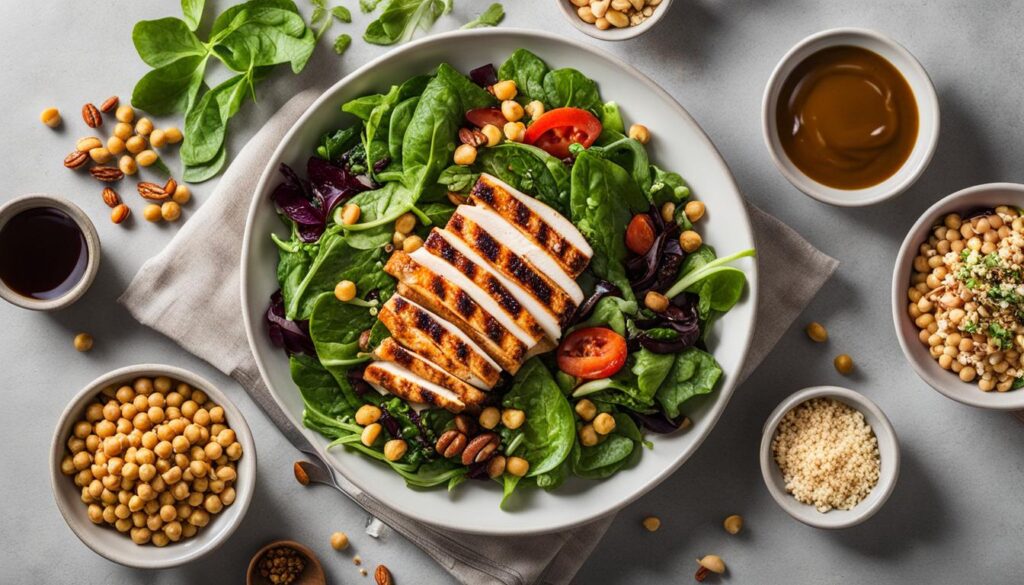
The Importance of Complete Proteins
Complete proteins, found in animal-based sources, contain all the essential amino acids that the body needs. These amino acids cannot be produced by the body and must be obtained through diet. Consuming complete proteins ensures that you are providing your body with all the necessary building blocks for optimal health and well-being.
I always make sure to include a variety of animal-based proteins in my diet to ensure I’m getting all the essential amino acids my body needs for muscle repair and growth.
Ensuring Essential Amino Acids with Plant-Based Proteins
While plant-based proteins may not be complete proteins on their own, combining different plant-based protein sources can help ensure that you are getting all the essential amino acids. For example, combining beans and rice or tofu and quinoa can create a complete protein source that provides all the necessary building blocks for your body.
As a vegan, I make it a point to combine different plant-based proteins in my meals to ensure I’m meeting my protein needs and getting all the essential amino acids.
Whether you choose animal-based or plant-based proteins, incorporating a variety of protein sources into your diet can help you meet your protein needs and support your overall health and well-being.
Incorporating Protein Into Your Weight Loss Plan
To achieve successful weight loss, it is essential to incorporate protein into your meal planning. Protein not only helps you feel fuller for longer but also plays a key role in preserving muscle mass and boosting metabolism. Here are some tips on how to include protein in your weight loss plan:
1. Balanced Meals with Protein
Make sure your meals are well-balanced, including a good source of protein. Opt for lean proteins such as chicken breast, fish, tofu, or beans to keep your meals healthy and satisfying.
2. Protein-Rich Snacks
Combat hunger between meals by incorporating protein-rich snacks into your diet. Greek yogurt, cottage cheese, or a handful of almonds are excellent choices that provide a quick and tasty protein boost.
3. Timing Protein Intake
Be mindful of when you consume protein throughout the day. Including a protein-rich breakfast can help control your appetite and maintain steady energy levels throughout the day. Distribute your protein intake evenly throughout your meals to ensure a consistent supply of essential amino acids.
4. Combining Protein with Strength Training
If you’re looking to maximize your weight loss efforts, consider incorporating strength training exercises into your routine. Combining a higher protein diet with strength training helps preserve muscle mass, which is essential for a healthy metabolism and long-term weight management.
By following these strategies, you can effectively incorporate protein into your weight loss plan and optimize your results. Remember, a well-rounded approach that includes balanced meals, protein-rich snacks, and strength training can help you achieve sustainable weight loss and improve your overall health.
Check out the table below for a breakdown of protein-rich food options:
| Protein-Rich Foods | Protein Content per Serving |
|---|---|
| Chicken breast (cooked, skinless) | 24g |
| Salmon (cooked) | 22g |
| Tofu | 10g |
| Lentils (cooked) | 18g |
| Greek yogurt | 17g |
| Almonds | 6g |
Image:
The Power of Protein and Weight Management
Protein is a powerful tool in managing your weight effectively. Its impact on appetite control, muscle preservation, and metabolic rate makes it an essential component of a successful weight management plan.
When it comes to appetite control, protein is unmatched. It has been shown to increase satiety and reduce cravings, helping you stay on track with your calorie intake. By including protein-rich foods in your meals and snacks, such as lean meats, fish, eggs, and legumes, you can keep hunger at bay and prevent overeating.
Furthermore, protein plays a crucial role in preserving lean muscle mass. During weight loss, it’s common to lose both fat and muscle. However, by consuming an adequate amount of protein and engaging in regular strength training exercises, you can minimize muscle loss and promote the growth and repair of muscle tissues.
Another benefit of protein is its impact on metabolic rate. Protein has a higher thermic effect of food compared to carbohydrates and fats, meaning that your body burns more calories digesting protein. This boost in energy expenditure can contribute to weight loss and long-term weight maintenance.
| Benefits of Protein in Weight Management | Explanation |
|---|---|
| Appetite Control | Protein increases satiety and reduces cravings, helping to control calorie intake. |
| Muscle Preservation | Protein supports muscle protein synthesis, preventing muscle loss during weight loss. |
| Improved Metabolic Rate | Protein has a higher thermic effect, leading to increased energy expenditure. |
Incorporating Protein for Long-Term Weight Maintenance
To harness the power of protein for lasting weight management, it’s important to prioritize protein-rich foods in your diet. Aim to include a source of protein in each meal, whether it’s a serving of chicken, fish, tofu, or dairy products. Additionally, opt for protein-rich snacks like Greek yogurt, cottage cheese, or protein bars, to keep you satisfied between meals.
Timing is also key when it comes to protein intake. Studies have shown that spreading out protein consumption throughout the day, with a particular focus on having a protein-rich breakfast, can improve appetite control and support weight management goals.
Lastly, combining a higher protein intake with regular strength training exercises can maximize the benefits of protein in weight management. Strength training helps build and maintain muscle mass, which increases your resting metabolic rate and allows you to burn more calories at rest.
Conclusion
Protein plays a crucial role in weight loss and sustainable weight management. Its impact on metabolism, appetite control, and muscle preservation makes it an essential component of any successful weight loss plan. By understanding the power of protein and incorporating it into your diet, along with strength training, you can achieve your weight loss goals and maintain a healthier, leaner, and more energetic you.
Protein’s benefits go beyond weight loss. It contributes to overall well-being by supporting muscle growth and repair, boosting metabolism, and providing a sense of satiety. By prioritizing protein in your meals and snacks, you can experience lasting results and improve your overall health and vitality.
Remember, sustainable weight management requires a balanced approach that combines proper nutrition, regular exercise, and a positive mindset. By making protein a key part of your weight loss plan, you can harness its benefits for lasting results. Start incorporating protein-rich foods into your meals, plan protein-rich snacks, and consider consulting with a dietitian or nutritionist to tailor your protein intake to your specific needs. Embrace the power of protein and embark on your journey towards a healthier, more fulfilling lifestyle.
FAQ
Why is protein important for weight loss?
Protein plays a crucial role in weight loss by boosting metabolism, increasing satiety, and preserving muscle mass.
How does protein impact metabolism?
Protein has a higher thermic effect of food, where the body burns more calories digesting protein compared to carbohydrates and fats, thus boosting metabolism.
Does protein help control appetite?
Yes, protein increases satiety and helps control appetite, which can reduce calorie intake and support weight loss efforts.
How does protein preserve muscle mass during weight loss?
Protein provides the necessary amino acids for muscle protein synthesis, supporting muscle growth and repair, helping preserve lean muscle mass during weight loss.
Can a higher protein diet enhance weight loss outcomes?
Research suggests that a higher protein diet can enhance weight loss outcomes by promoting fat loss and preserving muscle mass.
How much protein should I consume during weight loss?
The recommended protein intake during weight loss is approximately 1.2 to 2.2 grams per kilogram of body weight, but individual variations and factors like activity level also influence protein requirements.
What are some sources of protein?
Protein can be sourced from both animal-based options such as lean meats, poultry, fish, and dairy products, and plant-based options like beans, lentils, tofu, and nuts.
How can I incorporate protein into my weight loss plan?
You can incorporate protein into your weight loss plan by including a source of protein in every meal, choosing protein-rich snacks, timing protein intake throughout the day, and combining a higher protein diet with strength training exercises.
Does protein play a role in long-term weight maintenance?
Yes, protein helps control appetite, preserves muscle mass, and improves metabolic rate, contributing to long-term weight maintenance and sustainable weight management.

